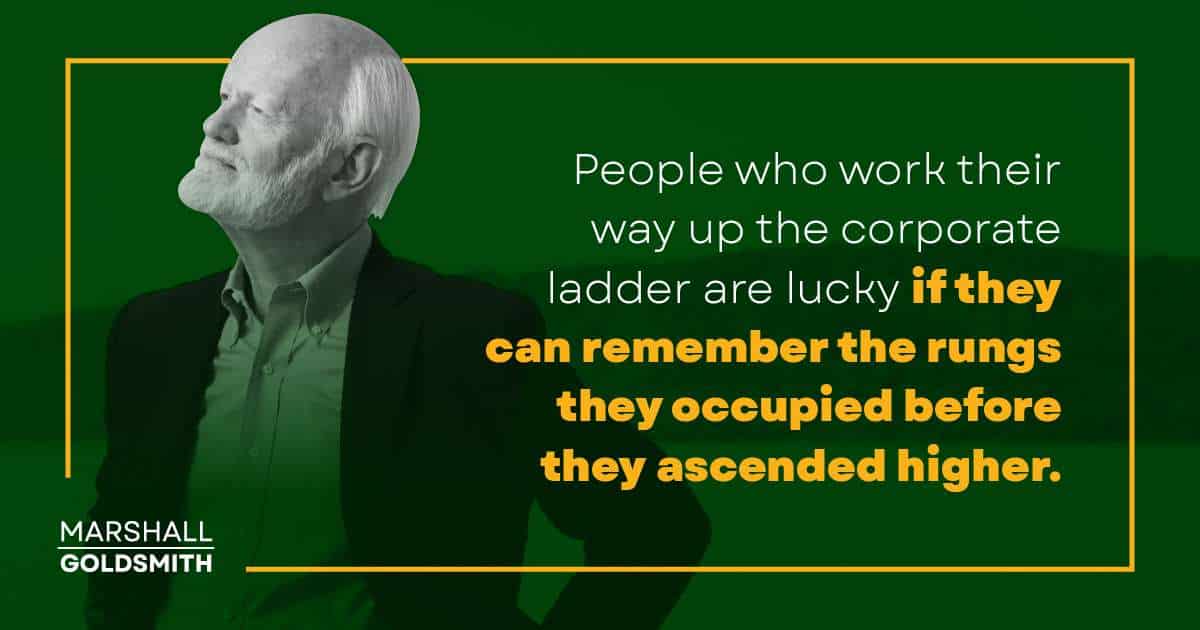Playing Favorites By Marshall Goldsmith There’s a reason I devote...
A lot has been written about emotional intelligence which, in essence, comes down to understanding that you’re not the center of the world. It means paying attention to others. It means having perspective on your role, and comprehending the role of others. It means, in a profound way, that you are completely aware that other people are fully as human as you are.
Many of us have a hard time seeing from the perspective of another person and how that other person reacts to us, or to the situation. This can be particularly true in corporate settings, when there’s a hierarchy of responsibilities, titles, salaries, and such. People who work their way up the corporate ladder are lucky if they can remember the rungs they occupied before they ascended higher.

Understanding is your knowledge of what to do and how to do it.
My doctoral thesis focused on behavior in groups, and I regarded understanding in terms of role perception — I viewed it through the prism of order and rank. Do people understand their role in the hierarchy?
For example, as an engineer, you have the same ability as all the other engineers in your department, more or less. Like them, you are a cog in a big machine. In that situation — which is how we studied organizational behavior fifty years ago — “understanding” meant knowing what particular job in that machine you were expected to do. It meant that you didn’t deviate from your role. As a result, there was no misunderstanding between you and your superiors about your responsibilities. You stayed in your lane. The lane may be more complex and crowded for, say, an emergency room doctor or a police officer, each of whom must play many roles during a work shift. But the successful ER doctor understands their job is about alleviating pain and repairing damage. The successful police officer understands it is about keeping people safe. They stay in their lanes, too.
My views changed when I started working one-on-one with executives to improve their interpersonal skills. Roles still mattered, but so did so-called “softer” attributes, such as timing, gratitude, kindness, listening, and, most valuable of all, trusting the Golden Rule.
These are the values that guide us in any situation, including the pursuit of an earned life.
In my own life, I needed a small, painful, and teachable moment for me to realize this.
I was once invited to speak at a dinner event for an insurance company’s key managers. I completely misread my audience. I was too jocular for a group whose company had recently suffered a serious reversal.
Afterward, the CEO told me that I had offended him and his team. The evening was a disappointment for him — and his critique of me was torture for me to hear. The error was all mine, of course, and it was an error of Understanding. That’s because I had misunderstood my role. I had assumed that I was there as one-part teacher, one-part entertainer. In fact, I was the company’s guest. That was my role, and I’d basically walked into their home with mud on my shoes.
Saving the situation required so-called soft values. In this case, that meant focusing on the CEO’s disappointment rather than my own shame. I needed to observe the present moment clearly. I needed to read the CEO standing in front of me better than I had read the room earlier in the evening.
I considered offering to speak for free the next time, but given my performance, the CEO wasn’t in the mood for a next time. I considered doing nothing, hoping that time would heal this wound. But in that instant I remembered the truism that customers will forgive any problem if they can see that you care enough to correct it swiftly. That’s when the Golden Rule kicked in.
What would I expect if the tables had been turned and I was the displeased CEO? I understood what needed to be done. Although the speaking fee was significant—as much as some people make in a year—I told the CEO, “This one’s on me.” When the check arrived a few days later, I returned it to him with an apologetic note. I understood that both of us needed proper closure, me more than him.
Part of Understanding is knowing the difference between good and not good enough—and accepting that in any situation, we can be one or the other.

Adding Too Much Value Won’t Get You There By Marshall...
C-Suite Master Class: No, But, However By Marshall Goldsmith Continuing...
The Doerr Institute: Expanding the Market for Coaches By Marshall...
Making Leadership Development Part of the College Degree at Rice...
Sanyin Siang – Winner of the Thinkers50 Marshall Goldsmith Coaching...
Thinkers50 Marshall Goldsmith Distinguished Achievement Award in Coaching – Nominees...
Leading with Influence: What Is Influence360°? By Marshall Goldsmith Founder...
Are You a Dominator, Manipulator, Persuader or Influencer? By Marshall...
Leading with Influence: Redefining Modern Influence Part 2 By Marshall...
My mission is simple. I want to help successful people achieve positive, lasting change and behavior; for themselves, their people, and their teams. I want to help you make your life a little better. With four decades of experience helping top CEOs and executives overcome limiting beliefs and behaviors to achieve greater success, I don’t do this for fame and accolades. I do this because I love helping people!
As an executive educator and coach, I help people understand how our beliefs and the environments we operate in can trigger negative behaviors. Through simple and practical advice, I help people achieve and sustain positive behavioral change.